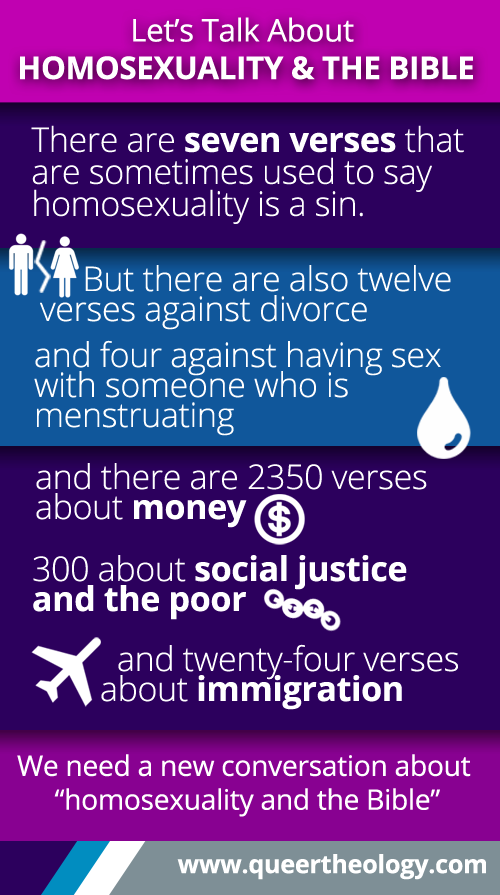Over the past 10 years I have found myself doing two things over and over again: Coming out (the idea that you come out once and it's all over is a fiction) and having conversations about the so-called "clobber passages" relating to homosexuality and the Bible. At least once a month I get an email or a phone call from someone asking me how I can reconcile a queer or trans* identity with Christianity.
As I've developed in my queer and trans* identity and in my understanding of the Bible, I have grown weary of those conversations. It's not that I can't have them -- in fact, I can recite the answers in my sleep -- it's that these conversations have becoming boring and draining. These conversations are distractions: They keep us bogged down in greek definitions and semantics while ignoring all of the beauty that queer and trans* people have to offer the church!
We've reduced everything to conversations on "homosexuality and the Bible," when in reality there are queer undertones all over the place -- if you know where to look. And not only that, there are so many issues that are queer issues: immigration, climate change, economic justice, prisons and race, just to name a few. We need a new conversation, a movement and a theology that thinks about the ways that all of these things are connected and what it means to follow Jesus in the midst of a world that is full of injustice.

As I've sat down and talked with other queer and/or trans* theologians and ministers (people like Brian Gerald Murphy, Allyson Robinson, Patrick Cheng, and Bishop Yvette Flunder, just to name a few) I am blown away by their insights. I am moved by their stories and their resilience. And I know how transformative it has been for me to read the Bible queerly.
I grew up in a very conservative evangelical church, but one of the things I appreciated about that church was the emotional connection I felt I had with God and with the Bible. The Bible was a love letter written directly to me. When I came out I had to leave the church that I had grown up in for my own mental and spiritual health. As I moved into the mainline church, my faith and my relationship with the Bible became intellectualized. Everything was reduced to historical criticism and the parsing of original languages. It was important for me to learn all of that and my mind came alive, but in my heart I missed God.
I remember the moment when it all came together for me. I was sitting in a class in seminary and we were exploring the story of Jesus' interactions with Thomas after the resurrection. By that time I had started my transition from female to male and every day I was answering invasive questions about my body. I was exhausted from the scrutiny and the intrusion. In that moment, sitting in that class, I understood how Jesus must have felt when Thomas didn't believe that he had been resurrected unless he could see his scars. It echoed so many conversations I had had with straight and cisgender people who wouldn't believe that I was male unless I told them how many surgeries I had had. As I was finally able to see my story reflected back to me in the story of Jesus, I was able to fall in love with God again. A God who was made visible in a man who carried scars on his resurrected body. In this moment I was able to begin to heal the disconnect between my head and my heart. Reading queerly saved my faith.
As I have shared my own story and journey I have found that people resonate with many of the things that I share, and not just queer and/or trans* people but straight and cisgender folks, too! As my friend Brian says, "queer people have so much more to offer the world than what we are not!" When we can move past the clobber passages we can enter into theology that is life giving and affirming for all people. I've been honored to get to do this work in small groups and one on one and now I'm excited to be able to have these conversations with a much larger group of people.
That's why I'm so excited about the course that Brian Gerald Murphy and I are rolling out today. It's called Reading Queerly and it's a six week multi-media course with videos, discussion questions, assignments and access to an amazing online community.
This course is the beginning of a new conversation around queerness and the Bible. It's a shift away from apologetics toward theology creation. It's a way of reclaiming silenced voices and writing our own narratives. Some of the folks who have explored the material have said things like, "I had no idea you could read the Bible this way," and "This is so much more exciting than conversations about the clobber passages." We want you to join us in this conversation.
Check out Reading Queerly and join the conversation!
